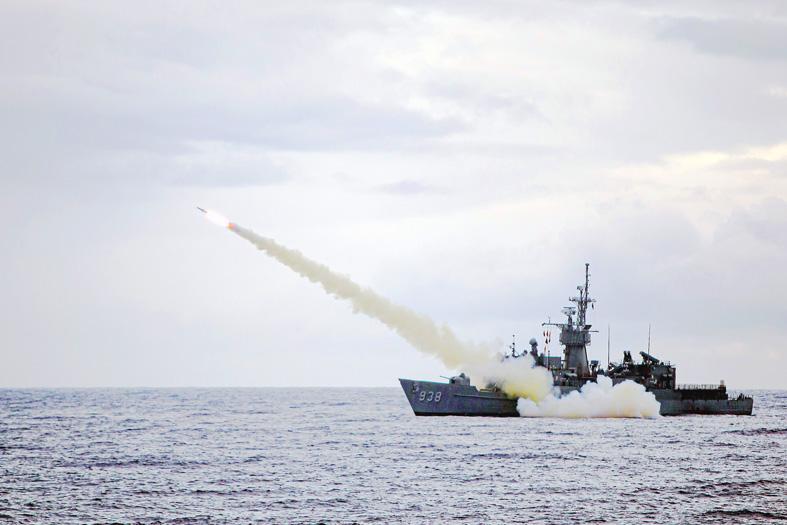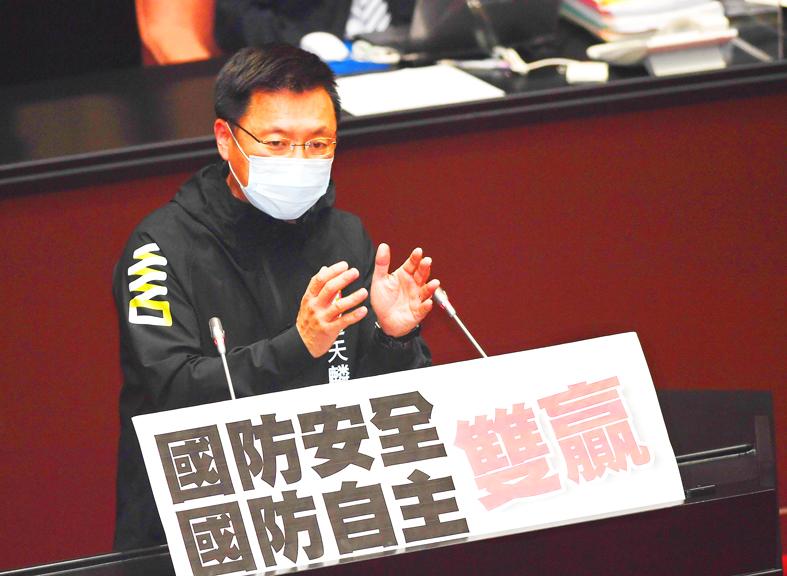The Legislative Yuan yesterday approved a bill authorizing the government to draft a special budget of up to NT$240 billion (US$8.63 billion) for arms procurements over the next five years.
The new law allows the government to use a special budget — which is not subject to the spending constraints of the normal budgeting process — to acquire mostly indigenous weapons to upgrade the nation’s anti-air and anti-surface capabilities.
The Executive Yuan would soon write a special budget based on the new law and submit it for review to lawmakers, said Democratic Progressive Party (DPP) Legislator Chao Tien-lin (趙天麟), a convener of the legislature’s Foreign Affairs and National Defense Committee.

Photo courtesy of the Ministry of National Defense via CNA
Premier Su Tseng-chang (蘇貞昌) would then attend a hearing held by the Legislative Yuan to elaborate on the special budget and answer questions about it, Chao said.
Under the new law, the Ministry of National Defense would submit a written report to the legislature every May on the progress made in the previous year and the spending plan for the following year.
Eight types of weapon systems can be purchased under the special budget: shore-based anti-ship missiles, field and ground-based air defense systems, uncrewed aerial vehicles, air-to-ground and surface-to-surface cruise missile systems, high-performance submarines and weapon systems for the coast guard.

Photo: CNA
The production of the Taiwan-made Tien Kung (Sky Bow), Tien Chien (Sky Sword) and Hsiung Feng (Brave Wind) series of missiles would be supported by the budget, the ministry said.
When the Executive Yuan proposed the bill in September, Su said it was part of the effort to safeguard national sovereignty and security, as China continues to engage in military exercises near Taiwan.

MAKING WAVES: China’s maritime militia could become a nontraditional threat in war, clogging up shipping lanes to prevent US or Japanese intervention, a report said About 1,900 Chinese ships flying flags of convenience and fishing vessels that participated in China’s military exercises around Taiwan last month and in January last year have been listed for monitoring, Coast Guard Administration (CGA) Deputy Director-General Hsieh Ching-chin (謝慶欽) said yesterday. Following amendments to the Commercial Port Act (商港法) and the Law of Ships (船舶法) last month, the CGA can designate possible berthing areas or deny ports of call for vessels suspected of loitering around areas where undersea cables can be accessed, Oceans Affairs Council Minister Kuan Bi-ling (管碧玲) said. The list of suspected ships, originally 300, had risen to about

DAREDEVIL: Honnold said it had always been a dream of his to climb Taipei 101, while a Netflix producer said the skyscraper was ‘a real icon of this country’ US climber Alex Honnold yesterday took on Taiwan’s tallest building, becoming the first person to scale Taipei 101 without a rope, harness or safety net. Hundreds of spectators gathered at the base of the 101-story skyscraper to watch Honnold, 40, embark on his daredevil feat, which was also broadcast live on Netflix. Dressed in a red T-shirt and yellow custom-made climbing shoes, Honnold swiftly moved up the southeast face of the glass and steel building. At one point, he stepped onto a platform midway up to wave down at fans and onlookers who were taking photos. People watching from inside

Japan’s strategic alliance with the US would collapse if Tokyo were to turn away from a conflict in Taiwan, Japanese Prime Minister Sanae Takaichi said yesterday, but distanced herself from previous comments that suggested a possible military response in such an event. Takaichi expressed her latest views on a nationally broadcast TV program late on Monday, where an opposition party leader criticized her for igniting tensions with China with the earlier remarks. Ties between Japan and China have sunk to the worst level in years after Takaichi said in November that a hypothetical Chinese attack on Taiwan could bring about a Japanese

The WHO ignored early COVID-19 warnings from Taiwan, US Deputy Secretary of Health and Human Services Jim O’Neill said on Friday, as part of justification for Washington withdrawing from the global health body. US Secretary of State Marco Rubio on Thursday said that the US was pulling out of the UN agency, as it failed to fulfill its responsibilities during the COVID-19 pandemic. The WHO “ignored early COVID warnings from Taiwan in 2019 by pretending Taiwan did not exist, O’Neill wrote on X on Friday, Taiwan time. “It ignored rigorous science and promoted lockdowns.” The US will “continue international coordination on infectious